Nylon CNC Machining
Polyamide (PA), commonly referred to as nylon, is a thermoplastic/functional polymer with significant mechanical properties and high chemical resistance. CNC machining technology can effectively cut nylon parts accurately and achieve precise machining details.
- Certified Materials
- Factory Price
- No Minimum Order
- Fast Turnaround
Save 30% cost on average!

CNC Machining for Your Custom Nylon Parts
Are you looking for a reliable partner to provide CNC machining services?
Based in China, AT-Machining is a leading provider of CNC machining services. With a capacity of over 50 CNC machines, including 3-axis, 4-axis, and 5-axis milling and turning centers, we can produce top-quality CNC parts that meet your specifications. Outsource your custom and precision CNC machining needs confidently, regardless of your industry.
Request a quote today to get started.
Experience exceptional versatility and precision in the CNC machining of your Nylon parts with our optimized 3, 4, and 5-axis CNC milling service.
CNC turning of nylon parts ensures precision, high durability, and smooth finishes, ideal for diverse industrial and mechanical applications.
Elevate the surface finishing of your CNC machined Nylon parts by utilizing additional finishing techniques, such as polishing or sandblasting, to achieve a smooth and refined appearance.
What is Nylon?
Nylon is a synthetic thermoplastic polymer that is valued for its exceptional durability, strength, and resistance to heat, wear, and chemicals. Originally developed in the 1930s as a replacement for silk, it has become a popular material in a variety of applications such as textiles, automotive parts, packaging, and engineering components. Nylon is available in various grades, each with distinct properties and characteristics, making it a versatile material for use in many manufacturing processes.
Some of the key properties of Nylon include:

- Chemical Resistance
- High strength and durability
- Heat resistance
- Lightweight
- Good electrical properties
- Low friction coefficient
Nylon 6/6 is the most common grade of nylon, made of polyamide polymer and reinforced with glass fibers. It offers high tensile strength, stiffness, and toughness, making it ideal for applications requiring high mechanical performance. Additionally, it has good chemical resistance, dimensional stability, and is easy to machine. Its uses include automotive, electrical, and consumer products.
Nylon 6 is known for its lower melting point, better impact resistance, and lower tensile strength compared to Nylon 6/6. It also has a higher moisture absorption rate, which can affect its mechanical properties.
Nylon 12 exhibits good chemical resistance, flexibility, and low moisture absorption. It is often used in applications such as flexible tubing, cable sheathing, and automotive fuel lines.
Glass-Filled Nylon: Reinforced with glass fibers, this type of Nylon offers even greater strength and stiffness than regular Nylon, making it ideal for structural components and parts subject to high loads and stresses.
This grade of nylon offers improved resistance to moisture absorption and dimensional stability, making it suitable for applications where exposure to moisture or environmental conditions is a concern. It is commonly used in tubing, hoses, and fluid handling systems.
Nylon 11 (PA 11): Nylon 11 is known for its excellent resistance to chemicals, oils, and fuels. It offers good impact strength and flexibility, making it suitable for applications such as fuel lines, hydraulic hoses, and tubing.
Nylon(PA) Mechanical Properties Chart
Optimize the mechanics and mechanical properties of Nylon materials by selecting from a range of Nylon grades that fit your project requirements.
| PA6 | PA6/6 | PA12 | Glass-Filled PA | PA6/12 | |
|---|---|---|---|---|---|
| Tensile Strength | 0-85 MPa (7,250-12,330 psi) | 75-85 MPa (11,000-12,300 psi) | 60-70 Mpa(8,700-10,100 psi) | 75-200 MPa (11,000-29,000 psi) | 55-80 MPa (8,000 psi to 11,600 psi) |
| Flexural Strength | 70-110 MPa (10,150-15,950 psi) | 115-140 MPa (16,700-20,300 psi) | 90-100 Mpa(13,000-14,500 psi) | 120-260 MPa (17,000-38,000 psi) | 80-110 MPa (11,600 psi to 15,900 psi) |
| Elastic Modulus | 2-4 GPa (290,000-580,000 psi) | 2.4-3.0 GPa (350,000-435,000 psi) | 1-2 Gpa(174,000-188,500 psi) | 5-20 GPa (725,000-2,900,000 psi) | 1,500-2,200 MPa (218,000-319,000 psi) |
| Impact Strength | 10-30 kJ/m^2 | 9-16 KJ/m^2 | 15-25 kJ/m^2 | 20-80 kJ/m^2 | 60-100 kJ/m^2 |
| Compressive Strength | 60-80 MPa (8,700-11,600 psi) | 75-110 MPa (11,000-16,000 psi) | 70-80 Mpa(10,000-12,000 psi) | 110-180 MPa (16,000-26,000 psi) | 60-80 MPa (8,700-11,600 psi) |
| Vickers Hardness | 170-210 HV | 170-190 Hv | 30-40 HV | 100-200 HV | 60-80 HV. |
Please note that these values are approximate and can vary depending on the specific manufacturer, processing conditions, and testing methods used. It’s always recommended to consult the material data sheet provided by the manufacturer for precise and detailed information on the properties of Nylon.
CNC machining Nylon materials involves using computer-controlled machines to accurately and precisely remove material from a block or sheet of Nylon, in order to create a desired shape or component.
The process involves creating a 3D CAD model of the desired part, which is then loaded into the CNC machine’s software. The machine then uses cutting tools to remove material from the Nylon block or sheet, guided by the CAD model, until the desired shape is achieved.
CNC machining Nylon can be used to create a wide variety of parts and components with high precision and accuracy.

Sam
The founder of AT-Machining has 30 years of CNC experience, dedicated to solving complex design and machining challenges for customers.
🔗 Best Practice
Control moisture: condition nylon to target humidity, seal stock, and bake-dry before finishing. Specify post‑machining reconditioning and dimensional limits accounting for hygroscopic swelling and creep over time.
Design for heat and deflection: use generous radii, thicker walls, ribs, and uniform sections. Limit deep pockets; specify light cuts, sharp tools, and coolant to avoid melting or smearing.
Plan thread and fit strategy: prefer metal inserts or molded threads; use coarse pitches, larger clearances, and rounded starts. Define torque limits and assembly temperature to prevent stress cracking.
Benefit of Nylon CNC machining
There are several benefits to CNC machining Nylon:
High Precision
Nylon CNC machining provides the benefit of high precision and accuracy, enabling the creation of complex shapes and features with tight tolerances.
Consistency
By leveraging CNC machining, manufacturers can produce Nylon parts in large volumes with consistent quality and precision.
Faster Turnaround
CNC machining enables fast and efficient production of Nylon parts, leading to significant time and cost savings compared to traditional manufacturing methods.
Flexibility
CNC machines can produce Nylon parts in a wide range of shapes and sizes, making it possible to create customized parts to meet specific design requirements.
Material Properties
Nylon is a recyclable material, making it a more sustainable option for manufacturing compared to other materials that are difficult to recycle or not recyclable at all.
Cost-Effective
CNC is an affordable method for low-volume production runs as it has low setup costs and can be automated, lessening the requirement for manual labor.

Optimize Design
Simplifying the design and reducing the complexity of the part can reduce machining time and waste material

Larger Batch Sizes
Ordering larger quantities of parts can often result in reduced cost per part due to economies of scale

Use Efficient Tool Paths
CNC machines can be programmed to use the most efficient tool paths to reduce machining time and tool wear

Supplier Selection
Experienced CNC companies like AT-Machining can produce Nylon parts cost-effectively by providing expertise in material selection, design, and machining optimization.
Application of CNC Machined Custom Nylon Parts

Automotive Industry
Nylon's low friction and high wear resistance make it ideal for timing belt guides, ensuring smooth engine operation.

Industrial Machinery
Used in fluid handling systems, nylon valve seats offer excellent chemical resistance and durability.

Electrical Applications
Widely used for organizing and securing cables, nylon cable ties are valued for their strength and flexibility.

Medical Devices
Nylon's biocompatibility and ease of sterilization make it suitable for various surgical tools and instruments.
Gallery of CNC machined Nylon parts
We specialize in offering first-class manufacturing services that cater to a broad range of industries, from medical and aerospace to marine robotics. We are ready and able to handle any project size with distinction regardless of the customer’s needs.
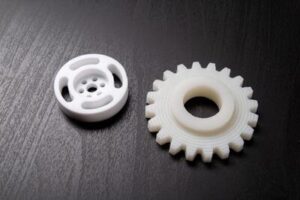
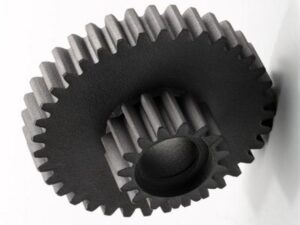
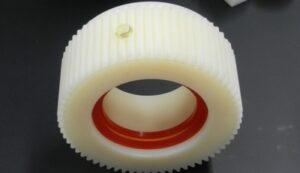
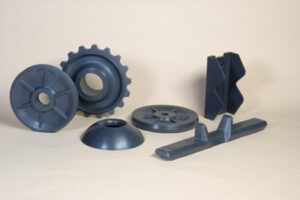
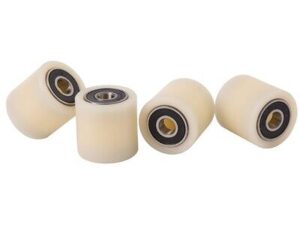
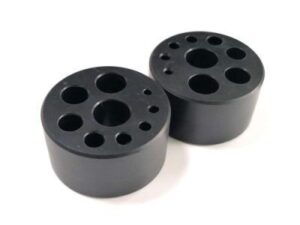
CNC Machining Nylon FAQs
Among the commonly used nylons, Nylon 6/6 and Nylon 6 are considered to be the strongest. Nylon 6/6 has a higher tensile strength and stiffness, while Nylon 6 has a higher impact resistance. However, the strength of a specific nylon material can also depend on its specific grade and the processing and manufacturing techniques used.
Nylon 6/6 and Nylon 6 are both considered good grades for machining, with Nylon 6/6 being slightly easier to machine due to its lower moisture absorption and better dimensional stability. Additionally, glass-filled nylon materials can also be good options for machining, as they offer increased strength and stiffness compared to unfilled nylons.
±0.3% with a lower limit of ±0.3 mm (±0.012″)
- Absorption of Moisture: Nylon has a high affinity for moisture, which can weaken its properties and dimensional stability.
- Poor UV Resistance: Nylon is not resistant to UV light, and its color can change over time when exposed to sunlight.
- High Cost: Nylon can be more expensive than other thermoplastics, which may make it less cost-effective for some applications.
CNC machining nylon presents several challenges due to its material properties and behavior.
Key challenges include material melting, chip evacuation, static electricity, tool deflection, material swarf, surface finish, and moisture absorption. These issues can lead to part deformation, poor surface finish, tool wear, and dimensional inaccuracies.
To overcome these challenges, optimizing cutting tools, parameters, and environmental conditions during the machining process is essential.



